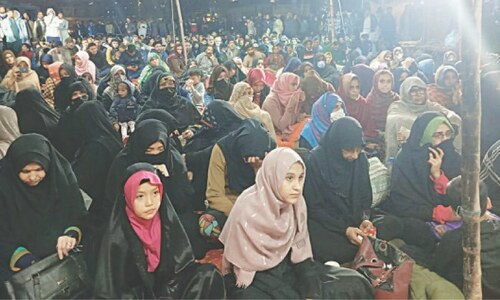KARACHI, Jan 31: The recent death of at least 23 animals at the Karachi Zoological Gardens might remain a mystery forever as the eagerly-awaited laboratory results have shown no bacterial or viral infection in the samples sent for diagnosis, sources told Dawn on Thursday.
It is the first time that samples from dead animals have been tested at a veterinary laboratory and that too after almost a month when reports of animals’ deaths had started appearing in the media.
The zoo administration has declared death of only 12 animals and had sent the samples of lungs, spleen, lymph nodes, liver and kidney from the dead animals to the Central Veterinary Diagnostic Laboratory (CVDL), Tandojam, more than two weeks ago. Most of the dead animals were fallow deer.
“All tests for bacterial infections, such as tuberculosis, and two viral diseases, foot-and-mouth (FMD) and PPR (Pest des petite ruminants) have come negative. Perhaps, the animals were under stress in cold weather that might have led to their death,” said a zoo official.
According to the official, the lab in Tandojam has facilities for detecting a range of bacterial infections but could run test for only two viral diseases: PPR and FMD.
He also said that no bacterial infection could be detected in the test if antibiotics had been administered to the animal, though a viral infection could be identified.
“No blood and fecal samples were sent to the Tandojam lab, though a request for the same had been made. Blood parasites and worms couldn’t be detected without these samples,” he said, adding that liver fluke, a blood-feeding parasite, could cause death in sheep and goat especially in winter as well as heavy worm infection.
The zoo initially sent samples to a laboratory (meant to test human samples) in the Defence Housing Authority and later to the Tandojam veterinary lab when the former lab could not find any life-threatening agent. The samples were tested twice at the Tandojam lab as the staff was unsatisfied with the few initial samples, which, they said, were not directly related to the kind of symptoms the animal had before their death.
In the initial testing at the Tandojam laboratory, the staff could only found traces of E. coli, which was not a disease causing agent unless the animal suffered from diarrhoea, the sources said.
Elaborating on the lapses in the whole episode and way for an improvement, wildlife experts said the zoo needed to have a well-equipped veterinary laboratory and trained staff for quality animal care and immediate disease diagnosis.
“The Karachi Metropolitan Corporation is only investing in bringing new animals or methods to generate more revenue while no attention is being paid to the well-being of animals. Right now, the KMC is keeping a huge number of animals at its different facilities, including Safari Park, Landhi-Korangi zoo and Garden zoo.
“But it’s ironic that it doesn’t have a veterinary laboratory or even adequate number of vets to take care of animal needs,” an official serving at the Sindh wildlife department said.
He also questioned the impartiality of the committee set up to investigate the deaths as it initially comprised vets serving under the KMC.
“All member of the committee, save one who initially investigated animal deaths, had expertise in managing the slaughter house and livestock. The KMC included two more vets (from the Sindh government) under media pressure. But it was done too late,” he said, adding that expertise from the private sector should have also been sought.
The animal deaths have officially been blamed on poor sanitation, unhygienic conditions and contaminated water.













































Dear visitor, the comments section is undergoing an overhaul and will return soon.